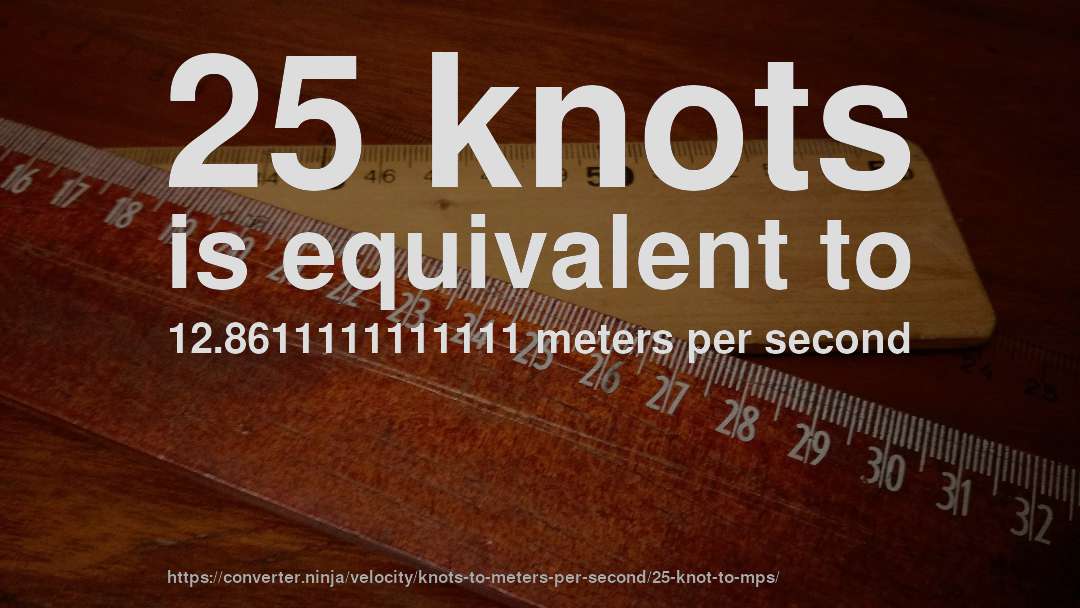

Metres per second are defined by the amount of distance travelled in metres, divided by the time it took in seconds. Therefore if you are travelling at one knot you are also travelling at 1852 metres per hour. As stated above a knot is a rate of speed. When to use m/s?Īs a unit of speed used to measure slower speeds, metres per second are used less commonly in everyday situations. A knot is a measure of speed: 1 nautical mile per hour it has absolutely nothing to do with metres. Above is our knots to metres per second converter. Its main purpose is to calculate the speed of vessels relative to the fluids in which they travel, whether that is water or air.

The unit of speed known as knots is an important measurement used in meteorology but also in the air navigation and maritime industries. A knot is equivalent to one nautical mile exactly. meters per second m/s 1 kilometer/hour km/h 0.2777777778 meters per second m/s 1 foot/second ft/s 0.3048 meters per second m/s 1 mile/hour mi/. knots / 1.94384 = metres per second When to use knots? As some examples, 6 kn = 3.09 m/s and 23 kn = 11.83 m/s

In order to do this conversion knots to m/s by hand, you might need to know the mathematical formula so we have provided it below for your use. One meter per second is exactly 3.6 kilometers per hour, or about 2.237 miles per hour. Something traveling at one knot is going about 1.151 land miles per hour. If you need to convert in the opposite direction, convert metres per second to knots. A knot is a unit of speed, equal to one nautical mile per hour. Input the amount of knots into the box above and click “convert” to be given a new quantity in metres per second by our knots to m/s converter.
#1 KNOT TO METERS PERSECOND HOW TO#
How to use the Converter for Knots to Mps? 1 Knot per Second 1 x 0.514444444 0.51444 Meters per Second Squared. 25 foot Paracord Fusion Ties - Volume 2 (PFT-V2) is the second. 1 kn/s2 is equal to 0.51444 m/s2, therefore 132.1 kn/s2 is equivalent to 67.958 m/s2. View all of our speed converters and try out this knots – m/s conversion tool. High-quality hand-made adjustable paracord bracelets Snake knot weave Made from. Also, they are both used for generally slower speeds such as knots which are used for ships and m/s to measure things travelling in space. Results may contain small errors due to the use of floating point arithmetic.These two units of speed, knots and metres per second, are both used non-commercially and are less likely to be found in everyday measurements and calculations. Wiki/BioReal NameKatharine KerrKat Kerr Physical StatusAge76 Year Old (Approx)HeightIn centimeters- 165 cm In meters- 1 The couple tied the knot on October. We assume you are converting between metre/second and knot. bikes averages at about 65 mph (104km/h) Thats knot speed Electric bikes. How many metres per second in 1 knots The answer is 0.51444444444444. it would need to cross 70 meters in 1/250th of a second While a paintball. The precision is 15 significant digits (fourteen digits to the right of the decimal point). knots to meters per second conversion cards 1 through 20 knots 1 kn to m/s 0.51 m/s 2 kn to m/s 1.03 m/s 3 kn to m/s 1.54 m/s 4 kn to m/s 2.06 m/s. Do a quick conversion: 1 meters/second 1.9438444924406 knots using the online calculator for metric conversions. Where metres per second are several orders of magnitude too slow to be convenient, such as in astronomical measurements, velocities may be given in kilometres per second, where 1 km/s is 1000 metres per second, sometimes unofficially abbreviated as kps." s−1, m s−1, m/s, or m/s, sometimes (unofficially) abbreviated as mps."Meter per second is an SI derived unit of both speed (scalar) and velocity (vector quantity which specifies both magnitude and a specific direction), defined by distance in metres divided by time in seconds.The SI unit symbols are m Wikipedia page of knots Meters Per Second Etymologically, the term derives from counting the number of knots in the line that unspooled from the reel of a chip log in a specific time." Worldwide, the knot is used in meteorology, and in maritime and air navigation-for example, a vessel travelling at 1 knot along a meridian travels approximately one minute of geographic latitude in one hour. The knot is a non-SI unit that is accepted for use with the SI. To convert 765.1 meters per second into knots we have to multiply 765.1 by the conversion factor in order to get the velocity amount from meters per second to knots. The same symbol is preferred by the IEEE kt is also common. The conversion factor from meters per second to knots is 1.9438444924423, which means that 1 meter per second is equal to 1.9438444924423 knots: 1 m/s 1.9438444924423 kt.
#1 KNOT TO METERS PERSECOND ISO#
The ISO Standard symbol for the knot is kn. "The knot (/nɒt/) is a unit of speed equal to one nautical mile (1.852 km) per hour, approximately 1.151 mph. This is how the units in this conversion are defined: Knots


 0 kommentar(er)
0 kommentar(er)
